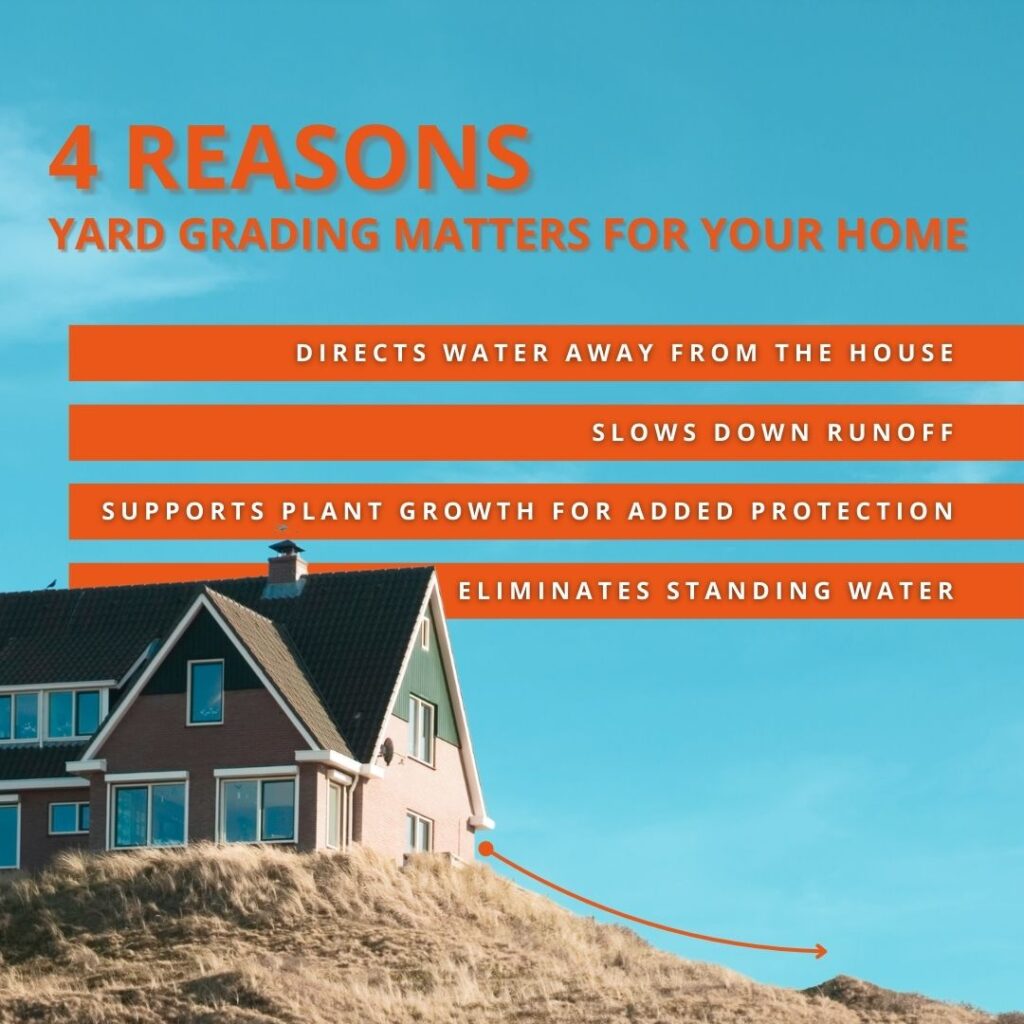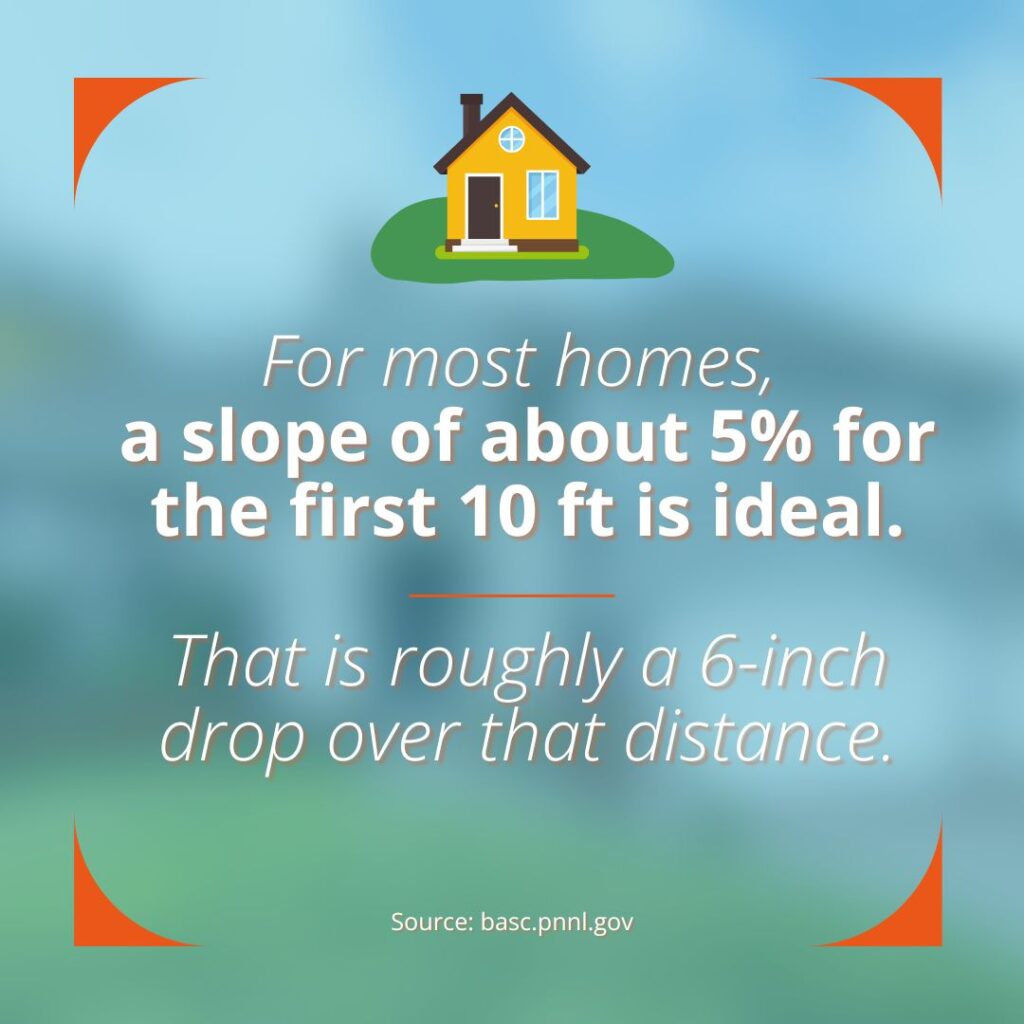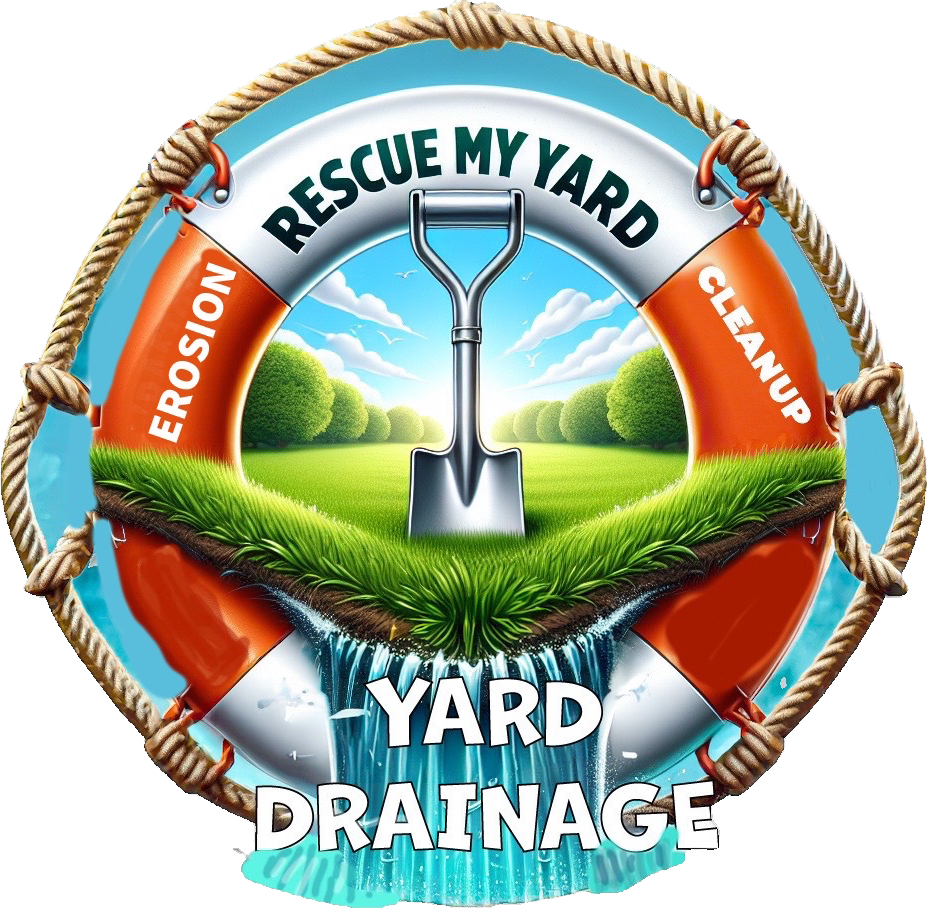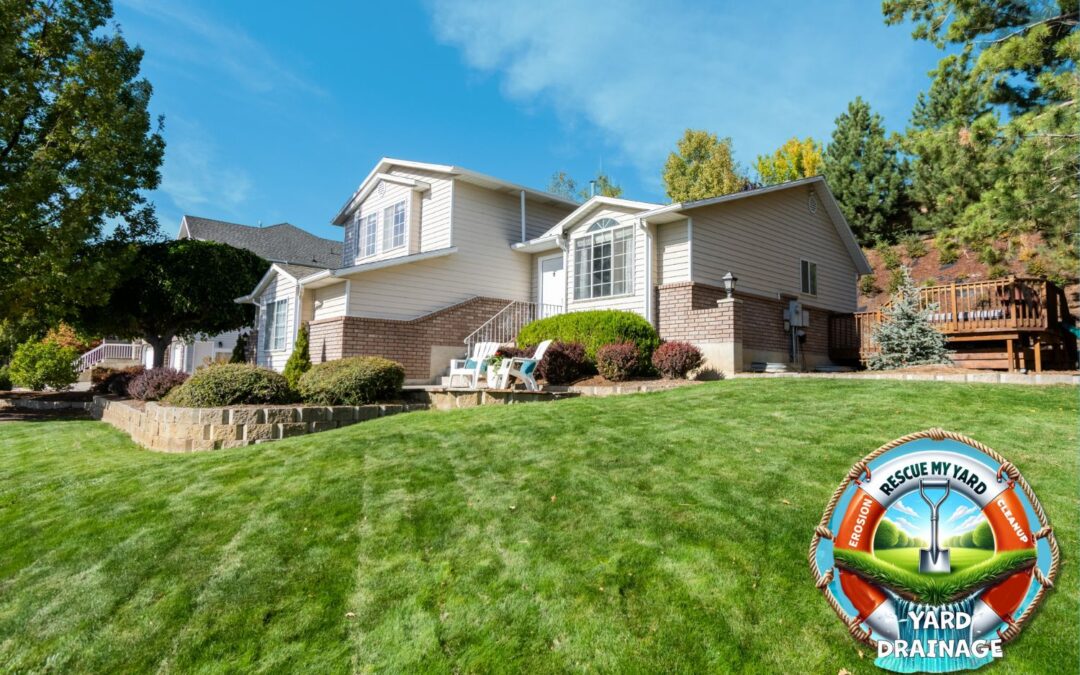Erosion is not always dramatic. It starts subtly, with small amounts of soil disappearing during heavy rain. Over time, bare patches appear, mulch slides out of flower beds, and the ground begins to sink in certain areas. Left unchecked, erosion can damage your landscaping, choke out healthy plants, and even put your home’s foundation at risk.
For homeowners in Georgia and across the country, proper yard grading is one of the best defenses against erosion. Here’s how it works and what you should know.
What Yard Grading Means and Why It Matters
Yard grading is the process of reshaping the land to create a gradual slope away from your home and toward designated drainage areas.
The goal is simple: keep water moving in a safe direction and prevent it from pooling in low spots or near the foundation.
A correct grade benefits your property by:
- Protecting the structure of your home from water intrusion
- Reducing the risk of soil erosion after storms
- Improving lawn and garden health through better drainage
- Preventing muddy areas and pest-attracting standing water
- Creating a more even, usable outdoor space
The USDA reports that erosion removes billions of tons of topsoil from U.S. land every year.
On a smaller scale, that same process can strip your yard of nutrient-rich soil that plants need to grow, leaving you with weak grass and struggling landscaping.

How Proper Grading Stops Erosion
1. Directing Water Away from Problem Areas
Water will always follow the easiest path downhill. Without grading, that path might be toward your foundation, across your driveway, or through your garden beds.
A carefully planned slope redirects water into safe drainage areas such as swales or stormwater systems, preventing damage before it starts.
2. Slowing Down Runoff
The faster water moves, the more soil it can carry away. A properly graded yard reduces runoff speed, allowing rainwater to soak naturally into the soil. This not only helps prevent erosion but also replenishes groundwater and supports healthy plants.
3. Supporting Plant Growth for Added Protection
Grading creates a stable surface where plants, grass, and shrubs can grow more evenly. Their root systems anchor the soil and form a natural barrier against erosion. This makes vegetation an important part of a complete grading and drainage strategy.
4. Eliminating Standing Water
Water that sits in low areas for more than a day can weaken the soil, attract mosquitoes, and create muddy patches that never seem to dry. Grading eliminates these low spots, giving you a drier, more functional yard year-round.
Signs You Need Grading Support
| Sign | Why It’s a Concern |
| Water pooling after rain | Weakens soil and can damage the foundation |
| Exposed roots on trees or shrubs | Shows soil loss and instability |
| Soil or mulch washing onto sidewalks | Indicates uncontrolled runoff |
| Uneven lawn with dips or ruts | Creates water traps and trip hazards |
| Damp basement or crawl space | Often linked to poor yard drainage |
Common Grading Mistakes
- Setting the wrong slope – Too flat and water will pool; too steep and water will erode soil more quickly.
- Ignoring soil compaction – Loose soil can shift after grading, undoing the work within a season.
- Not planning for water destinations – If water is moved away from the house but not guided to a safe outlet, it may cause problems elsewhere.
- Overlooking existing landscaping – Damaging root systems during grading can remove natural erosion protection.
- Failing to meet local drainage codes – Georgia counties often have rules for stormwater management that need to be followed.
Why Professional Yard Grading Is Worth It
Grading may look like a simple matter of moving soil, but it requires precision. Professionals use laser levels, survey tools, and compaction equipment to ensure the slope is set correctly and stays that way.
When you hire a team like Rescue My Yard, you get:
- Accurate slope measurements that meet both drainage needs and local regulations
- Soil stabilization techniques that prevent shifting after the project is complete
- Integrated drainage solutions, such as French drains or dry creek beds, if needed
- Knowledge of Georgia soils and how clay, sand, or loam affects water movement
Attempting a large-scale grading project without the right equipment can create new drainage issues and even increase erosion risk. A professional grading plan ensures your investment delivers long-term results.

Related Questions
Does grading solve all erosion problems?
Not always. In some cases, grading is combined with other solutions like retaining walls, erosion-control fabric, or strategic planting.
How steep should my slope be?
For most homes, a slope of about 5 percent for the first 10 feet away from the foundation is ideal. That is roughly a 6-inch drop over that distance.
How often should I check my yard’s slope?
Every two to three years, or after major storms or landscaping projects, since those events can alter the grade.
Can grading improve lawn appearance?
Yes. A smoother surface makes mowing easier, prevents water damage, and creates a more polished look.
Other Maintenance to Consider
If you are investing in yard grading to stop erosion, these services can help protect your property even further:
- French drains to direct water underground away from problem areas
- Retaining walls to hold back soil on sloped properties
- Rain gardens to absorb runoff in low-impact ways
- Regular gutter cleaning to ensure roof runoff is routed properly
- Aeration and overseeding to encourage dense grass coverage for soil protection
When to Call a Professional
If you notice water pooling, soil loss, or foundation dampness, do not wait until the next heavy rain. A professional can assess the grade of your yard, measure the slope accurately, and design a complete drainage plan. The right approach will account for your home’s layout, soil type, landscaping, and local weather patterns.
Rescue My Yard specializes in grading and drainage solutions tailored to Georgia properties. From precise slope adjustment to integrating erosion control measures, their team provides lasting fixes that protect your home and landscaping for years to come.
Conclusion
Erosion may start small, but over time, it can cause serious damage to your yard and home. Proper grading is one of the most effective ways to stop the problem before it starts. By controlling water flow, supporting healthy vegetation, and preventing pooling, you protect both your property’s value and its curb appeal.
If you are seeing signs of erosion or drainage problems, Rescue My Yard can help. Their experienced team will create a grading plan designed for your property, your soil, and your long-term needs.

